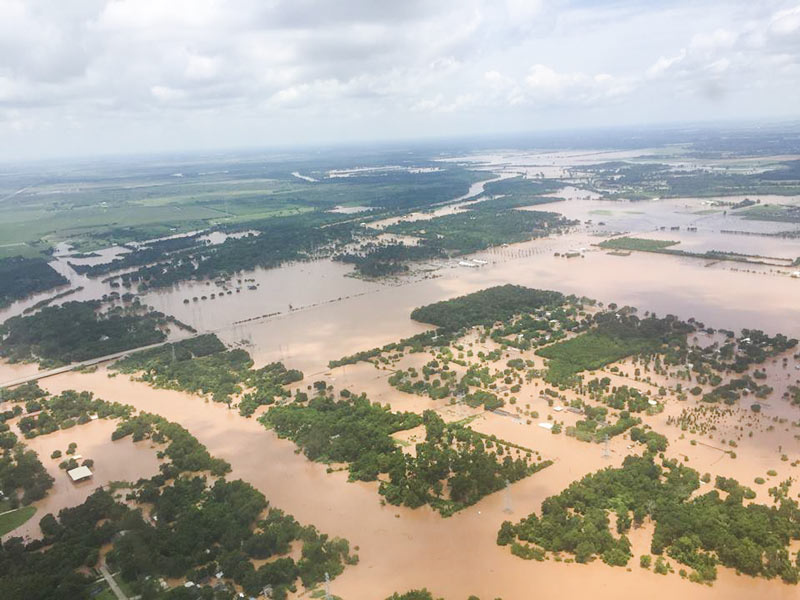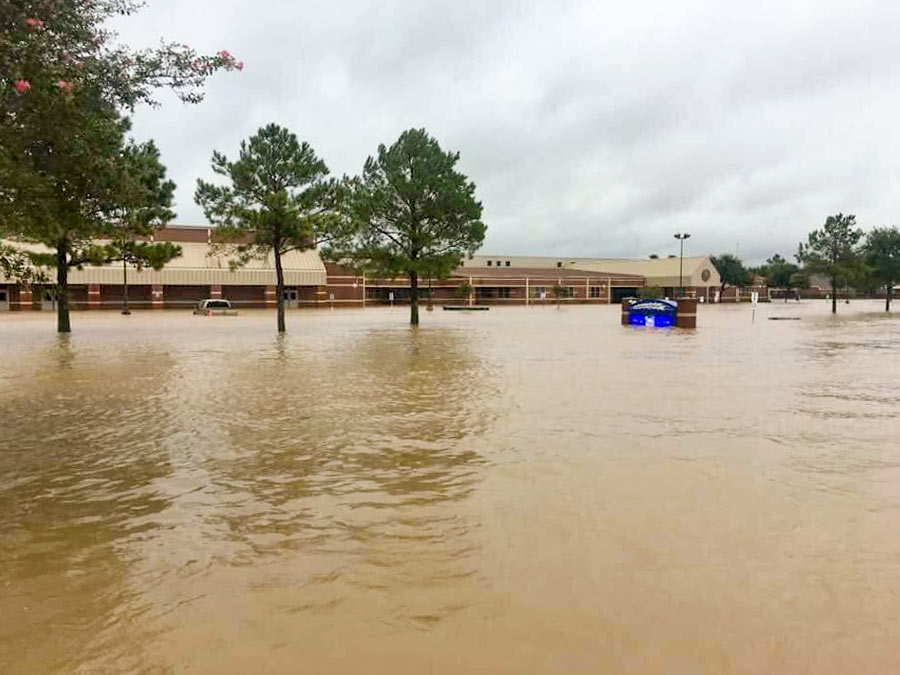REPEATED 100-YEAR FLOODING ADDS UP TO HOUSTON’S WETTEST YEAR AND A HALF ON RECORD  Internet weather guy Eric Berger takes a look today at 6 major flooding events in the Houston area over the past year and a half: last year’s Memorial Day flooding, the pre-Memorial Day flooding that preceded it, the Halloween flooding, the pre-Halloween flooding, this year’s Tax Day flooding, and this year’s Memorial Day weekend flooding. The 6 events, Berger writes, collectively pushed Houston’s rainfall total for the 18-month period ending with August up to more than 119 inches of rain, breaking the previous record by more than a foot. “The ultimate cause of this flooding isn’t entirely clear,” Berger writes, noting that none of the rainfall events listed were connected to tropical storms except for the late-October remnants of Pacific hurricane Patricia. But he does add that “it’s safe to say that rapid development of rural areas — converting prairies into concrete — and a warmer climate likely played some role in exacerbating what were already heavy rains.” [Space City Weather; previously on Swamplot] Photo of Brazos River flooding in June 2016: TxDOT
Internet weather guy Eric Berger takes a look today at 6 major flooding events in the Houston area over the past year and a half: last year’s Memorial Day flooding, the pre-Memorial Day flooding that preceded it, the Halloween flooding, the pre-Halloween flooding, this year’s Tax Day flooding, and this year’s Memorial Day weekend flooding. The 6 events, Berger writes, collectively pushed Houston’s rainfall total for the 18-month period ending with August up to more than 119 inches of rain, breaking the previous record by more than a foot. “The ultimate cause of this flooding isn’t entirely clear,” Berger writes, noting that none of the rainfall events listed were connected to tropical storms except for the late-October remnants of Pacific hurricane Patricia. But he does add that “it’s safe to say that rapid development of rural areas — converting prairies into concrete — and a warmer climate likely played some role in exacerbating what were already heavy rains.” [Space City Weather; previously on Swamplot] Photo of Brazos River flooding in June 2016: TxDOT





” But he does add that “it’s safe to say that rapid development of rural areas — converting prairies into concrete — and a warmer climate likely played some role in exacerbating what were already heavy rains.—
The reality is that these rain events would have caused massive flooding regardless of development patterns in our region. These were extreme events that were seen before time and again. Nothing unusual.
Yes, there is no reason to overreach for the effect of climate change. Paving prairies west of Houston is a very, very minor part of the process, affecting more the speed of runoff than the amount that fell from the sky.
If you want to track climate change, just keep an eye on the atmospheric CO2 graph, and the chart of “hottest months in recorded history”. That should give you you enough to worry about.
@ kjb434 Agreed, these kind of big rain events not associated with tropical storms have been happening in this area of Texas since records have been kept. Build a city in a rainy swamp and this is what you get.
@kjb – Amen. People don’t realize that the area’s climatology allows for extremes on a fairly frequent basis. Every time there is a flood, fire, drought, or hurricane, everyone jumps to blame it on global warming or some other man-made cause. The fact remains that in Texas, there will always be flood, fire, drought and hurricanes. They also create a frame of reference based on their lifetime, ignoring all the weather data that has been collected here since the 1880’s (even that is a short time span when talking climate). In the 1930’s, there was a flood so bad that the Brazos and Colorado Rivers merged near their mouths.
@Al Speaking of graphs…
@Superdave Speaking frame of reference…
http://www.xkcd.com/1732/
aw, thats cute another useful idiot and a cartoon graph to stir the populace into a frenzy. Can we talk about global cooling:
(https://news.google.com/newspapers?id=jjgiAAAAIBAJ&sjid=9KsFAAAAIBAJ&pg=1371,2354081&hl=en)
“Paving prairies west of Houston is a very, very minor part of the process, affecting more the speed of runoff than the amount that fell from the sky.”
.
Yeah, it only affects like, half the process. So keep paving and shrugging shoulders.
detroux: Yes, despite the Turning Basin comment, that is a very striking representation of what is going on “recently”. Here is the atmospheric CO2 graph, at least one version of it: http://climate.nasa.gov/news/916/for-first-time-earths-single-day-co2-tops-400-ppm/
For those of you that can’t be bothered by science, move right along, nothing to see here.
He’s a meteorologist guys. His entire professional existence is predicated on observing and studying the changing variables in atmospheric and meterological conditions and it’s potential impact on prevailing weather patterns. Insurance companies rely on scientific counsel, not anecdotal references from centenarians for good reason.
The premise of adopting anything in science as doctrine and dictating far reaching political policy based upon it, when both parties stand to gain and the hard grain of climate doctrine has continued to shift dramatically with “apocalyptic” predictions by “experts in their field” that have met their due date without coming to fruition, is foolish. The political tool that climate science has become deters me from believing further predictions from a scientific model that presents an answer before asking a question.
@Turning_Basin: Glub glub glub.